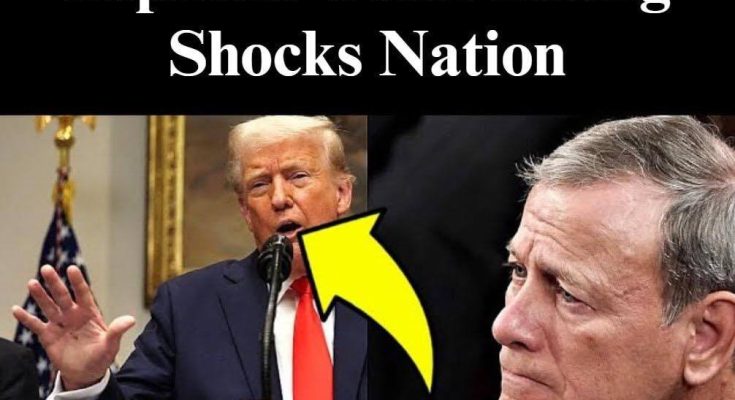President Donald Trump’s capacity to rapidly deport individuals suspected of being affiliated with a Venezuelan gang under the Alien Enemies Act has been temporarily halted by a split decision from a federal appeals court.
On Wednesday, a panel from the DC Circuit Court of Appeals ruled 2-1, allowing two lower court orders that prevent Trump from exercising this broad wartime authority to remain in place while a legal challenge regarding the president’s application of the law is ongoing.
Since the orders were issued on March 15 by US District Judge James Boasberg, which restrict the use of the Alien Enemies Act for deportations, they have sparked significant legal and political debate. Concerns have arisen regarding whether Boasberg’s court order was intentionally ignored, particularly after two flights carrying individuals deported under the act departed during an emergency hearing and did not return. Boasberg and the Justice Department have since been in dispute over the DOJ’s unwillingness to disclose further information about these flights, while Trump has called for Boasberg’s impeachment, prompting a rare rebuke from Chief Justice John Roberts.
To accelerate the deportation of migrants accused of being part of the Tren de Aragua gang, Trump invoked the Alien Enemies Act of 1798, which provides the president with considerable authority to target and remove undocumented immigrants. This law is designed for use in situations where the United States is at war or has been invaded or threatened by a foreign nation.
The appeals court’s ruling on Wednesday was unsigned. However, Judges Karen Henderson, appointed by former President George H.W. Bush, and Patricia Millett, appointed by former President Barack Obama, provided detailed opinions explaining their support for the court’s decision. Throughout the proceedings, Henderson highlighted the concern that allowing Trump to implement the law “risks exiling plaintiffs to a land that is not their country of origin,” where they could face potential harm.Henderson noted, “During the oral arguments before this Court, the government clearly indicated that if the injunction were lifted, it would commence deportations of the plaintiffs without any prior notification.” The plaintiffs assert that in its efforts against TdA, the government has unlawfully detained innocent individuals. One plaintiff alleges that he endured extreme torture, including “electric shocks and suffocation,” due to his protests against the Venezuelan government.
Judge Justin Walker, appointed by Trump during his first term, concentrated his dissent on a technical issue he raised during the oral arguments of the case. He argued that the claims of those who were deported should be addressed in a Texas court rather than one in Washington, DC. “The district court’s orders pose a risk of irreparable harm to sensitive negotiations with foreign nations regarding national security matters,” he remarked, referencing the Trump administration.
Walker contended that the plaintiffs’ desire to file the lawsuit in Washington is outweighed by the potential harm “along with the claimed public interest in the prompt removal of dangerous aliens.”
It is expected that the Trump administration will challenge this decision in the US Supreme Court.
In the early stages of the case, the Justice Department contested Boasberg’s orders. Following a more detailed ruling from the judge on the legality of Trump’s application of wartime law for these deportations, the case is likely to return to the DC Circuit in the coming weeks.
While explaining her rationale for wanting to uphold the disputed orders, Millett emphasized the case’s current status. “This case has been managed by the district court with considerable care and caution, and its orders are intended solely to preserve the status quo until significant and unprecedented legal issues can be addressed in an upcoming preliminary injunction hearing,” she stated.Millett remarked that endorsing the administration at this juncture would effectively nullify the Plaintiffs’ claims by placing them beyond the jurisdiction of their legal representatives or the court.
Millett also criticized the Trump administration’s assertion that it had not violated Boasberg’s bench order from earlier this month, which mandated the immediate reversal of any aircraft transporting migrants being deported under the Alien Enemies Act. DOJ attorneys have informed Boasberg that his written order, issued shortly after the proceedings commenced, serves as the authoritative ruling in the case, and that his verbal directive “did not constitute a binding injunction.” Notably, the written order did not address the issue of the planes; instead, it affirmed that the judge’s temporary restraining orders remained in effect, thereby prohibiting the administration from deporting migrants in light of Trump’s proclamation invoking the law.
Millett stated, “I allow the district court to evaluate the merits of that argument initially.” She added, “It is entirely unacceptable for the government to request this court to stay an order while simultaneously asserting to the district court that compliance with it was never necessary.”
She further explained, “The district court cannot obtain the extraordinary relief of a TRO stay if the government prevails and the district court does not.”



